The IPOS Strategic Overview
After months of work, the IPOS Consortium has published the IPOS Strategic Overview.
This document includes information on the Towards IPOS project and more details on the future implementation of the IPOS.
You can download it, or read it on this page.
Executive Summary
The Ocean is essential for life on Earth but is in crisis. Its health is declining and there are large gaps in the implementation of global commitments on Ocean sustainability, such as Sustainable Development Goal 14 “Life Below Water” and the Global Biodiversity Framework targets. There is a critical need to overcome fragmentation in Ocean knowledge and to provide actionable policy options for a healthy vibrant Ocean.
The International Platform for Ocean Sustainability (IPOS) is an innovative global demand-driven platform linking Ocean knowledge, policy and society, and operating at national and regional scales to help States and groups of States to accelerate the fulfillment of their international Ocean commitments. IPOS offers demand-driven, tailored services to deliver actionable knowledge and policy options that are responsive to the timelines of decision-makers. It integrates and enhances the best available knowledge and expertise from a wide array of reliable sources. These include global environmental assessment reports from the Intergovernmental Panel for Climate Change (IPCC), and findings from the Intergovernmental Science-Policy Platform on Biodiversity and Ecosystem Services (IPBES) or the World Ocean Assessments (WOA). Additionally, it draws on local and Indigenous knowledge systems, as well as peer reviewed academic literature and expertise from the private sector and civil society to develop action-oriented and context-specific policy options.
IPOS aims to offer rapid, robust and inclusive services including: Action Requests which synthesize diverse knowledge to co-develop policy options within one year in response to requests from States or groups of States, involving dynamic exchange between the requesting State(s) and relevant experts; Rapid Responses which provide knowledge outputs within a matter of weeks. Expert responses will be supported by a bespoke AI tool drawing on curated peer reviewed literature. Outputs will be peer reviewed and will comply with a best-practice AI ethics code; and the Ocean Catalyst which will facilitate dynamic exchange between diverse stakeholders on Ocean policy solutions, barriers to solutions and implementation, emerging priorities, and lessons learnt. All three services will operate at national and regional scales.
IPOS is proposed to operate under a collaborative and decentralised governance model, balancing global and regional coordination. This model actively engages diverse stakeholders, including UN Agencies, governments, scientific communities, civil society organisations, Indigenous peoples and local communities, and private sector representatives. Proposed governance bodies include a Secretariat, a Steering Committee and a Knowledge Committee (for further details on these bodies please see the "Governance & Transparency" tab). In addition, a global multi-stakeholder Knowledge Network will allow the IPOS to connect experts and stakeholders.
IPOS was launched at the 2025 UN Ocean Conference (UNOC-3), in a phased approach for testing and adapting services, methodologies and the functionality of the proposed governance structures. This 24-month test period will allow the refinement of IPOS services in a number of pilot geographic regions, and ensure adaptability based on outcomes before gradual expansion into other regions. IPOS has been officially endorsed as a Contribution to the UN Decade of Ocean Science for Sustainable Development (Ocean Decade). Through this alignment, IPOS would coalesce momentum and provide a framework for continuity and legacy.
IPOS benefits from growing global political and scientific support including declarations and/or statements from the European Commission, Belgium, Canada, Chile, China, Costa Rica, France, Fiji, Monaco, Panama, Seychelles and South Africa, and support from an expanding Coalition of Scientific Institutions.
IPOS is designed with a long term vision that is scalable and sustainable.
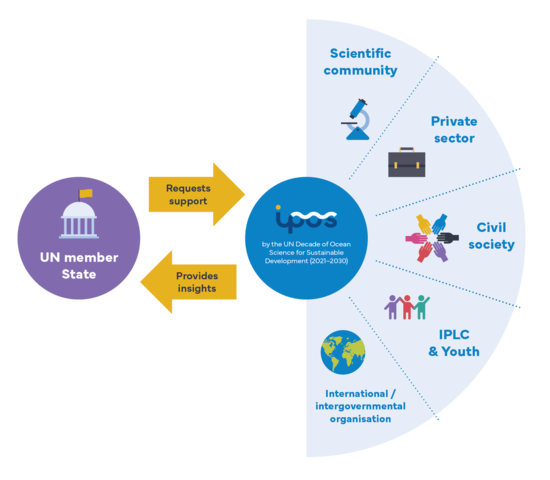

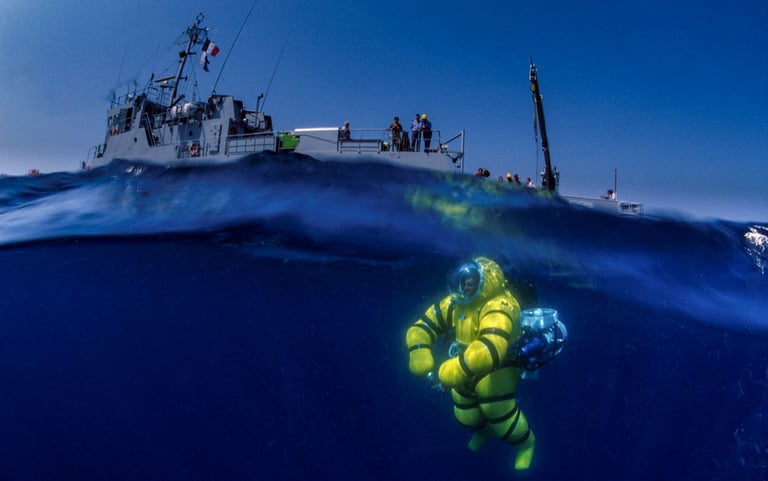

Picture courtesy of @alexis.rosenfeld
Accelerating the implementation of international Ocean targets from local to regional levels
Humans cannot thrive without a healthy Ocean. However, the Ocean is in crisis and is continuing to degrade due to challenges such as climate change, pollution and overfishing. Multilateral efforts, including the UN 2030 Agenda for Sustainable Development and Sustainable Development Goal 14, the Kunming-Montreal Global Biodiversity Framework (GBF), and the Biodiversity Beyond National Jurisdiction Agreement demonstrate rising awareness and collective will for a sustainable, healthy and resilient Ocean. Yet there is a large gap between globally agreed targets and the actions implemented by States towards their attainment. Time is of the essence and decision makers must take action under uncertainty and rapid change, embracing the precautionary approach.
Environmental assessment processes including the IPCC, the IPBES, and the WOA, along with initiatives such as the Ocean Decade, play a vital role in advancing the production and use of Ocean knowledge. However, this knowledge predominantly provides high-level, global insights, and is not always readily translated into the specific local economic, natural, social, and cultural contexts necessary for effective policy implementation. In addition, Ocean knowledge remains fragmented and consists mostly of natural sciences, with socio-economic and Indigenous perspectives less documented and not widely and equitably incorporated to reflect the interconnected social, economic and ecological nature of the Ocean and its people. The critical evidence base to underpin decisions must be responsive to the needs of decision makers, attuned to the context-specific issues faced by States and regions, and available within timelines aligned to decision makers’ needs.
The IPOS will be an innovative global demand-driven Ocean knowledge-policy society mechanism operating at national and regional scales to support States and groups of States to accelerate the fulfillment of their international Ocean commitments. IPOS will integrate and enhance the best available Ocean knowledge and expertise from diverse sources and global expertise ranging from global environmental assessment processes, such as the IPCC, the IPBES, and the WOA, to place based Indigenous and local knowledge.


Picture by Amit Uikey
Filling the gap at the knowledge-policy-society interface: IPOS at a glance
The Challenge
Closing the implementation gap between knowledge and political ambition to achieve international Ocean targets, and practical implementation at local and regional levels.


The need
Action for a sustainable, healthy and resilient Ocean requires rapid access to holistic knowledge and policy solutions that are actionable and relevant to local and regional contexts.
Rapid, robust, demand-driven and inclusive services that build on the best available knowledge and expertise from diverse sources to support knowledge-based decision making across scales to facilitate the achievement of national commitments towards global Ocean targets, aligning with regional challenges and objectives.
The Solution




Picture by Tim Mossholder
Picture by Jesse De Meulenaere
Picture by Vijesh Datt
The Process
Requests will be coordinated by empowered regional offices and supported by global level governance bodies that include diverse stakeholders.
The Result




Accelerated implementation of international Ocean commitments from local to regional levels, informed by holistic knowledge creating an equitable transition to a healthy sustainable Ocean.
Picture by Joshua Kettle
Picture by David Courbit
Rapid, robust and inclusive services to deliver tailored knowledge
Three complementary services are envisioned to implement the vision of the IPOS: Rapid Responses, Action Requests, and Ocean Catalyst operating at short, medium, and longer time scales respectively. While the primary target audience of outputs from all services will be States and groups of States, demands for Action Requests and Rapid Responses will be framed by the State(s) in question, whereas the Ocean Catalyst allows transformatory collaborative framing of relevant issues through the inclusive participation of a wide range of stakeholders representing societal perspectives. These services will be refined during the two-year “test phase” to ensure that they effectively respond to stakeholder needs.
Action Requests will deliver tailored knowledge and policy options to inform the implementation of international Ocean targets in response to formal requests from States or groups of States. Ad-hoc, hybrid working groups will be formed, consisting of global to local experts including scientists, Indigenous and local knowledge holders, civil society, and private sector representatives. The working groups will co-develop peer-reviewed outputs that present current knowledge and contextualised policy options together with their respective pros and cons. Outputs will build on existing knowledge from a wide range of sources including global environmental assessments such as WOA, IPCC and IPBES reports, and peer reviewed academic literature as well as Indigenous and local knowledge. Each request will typically be addressed within 12-months via facilitated engagement between the relevant IPOS Regional Office, the Secretariat, the working group, and the requesting State(s). Action Requests will often address multi-stakeholder challenges that require balancing conservation and sustainable use. For example, a State or group of States might seek an Action Request to reconcile coastal development or commercial fishing activities with GBF Target 2 (ecological restoration) or Target 3 (marine protection) through the lens of area-based management tools such as marine spatial planning.
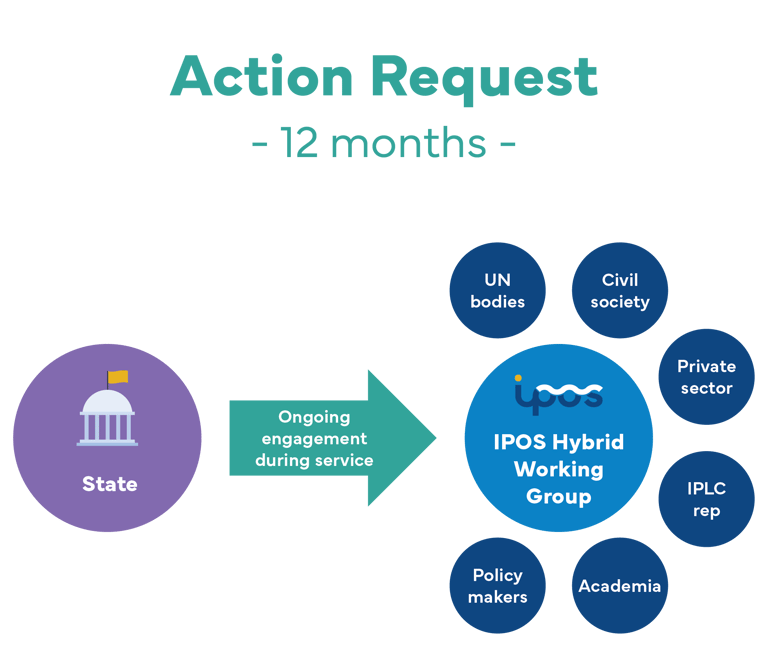

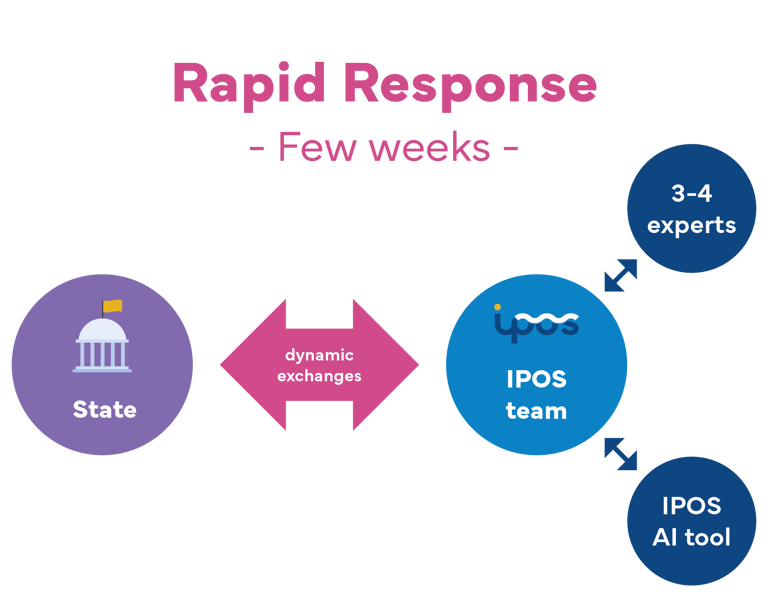

Rapid Responses will deliver peer-reviewed responses in a matter of weeks to States and groups of States requiring urgent knowledge to inform the implementation of international Ocean targets. Expert responses will be complemented by an IPOS curated AI tool to synthesize the best available knowledge from existing assessments and peer-reviewed literature to compile concise and accessible outputs, using a precautionary approach. A proof of concept for the IPOS AI tool is currently being developed, guided by advice from an interim Rapid Response knowledge committee, in compliance with an IPOS AI ethics code based on best practices. A variety of Rapid Response outputs will be available to decision-makers, including information briefs, comprehensive knowledge synthesis reports, or best practices for various methodological approaches. For example, a State interested in accelerating coastal restoration to fulfill Target 2 under the GBF may request a Rapid Response to compare and contrast the most effective policies for mangrove forest restoration.
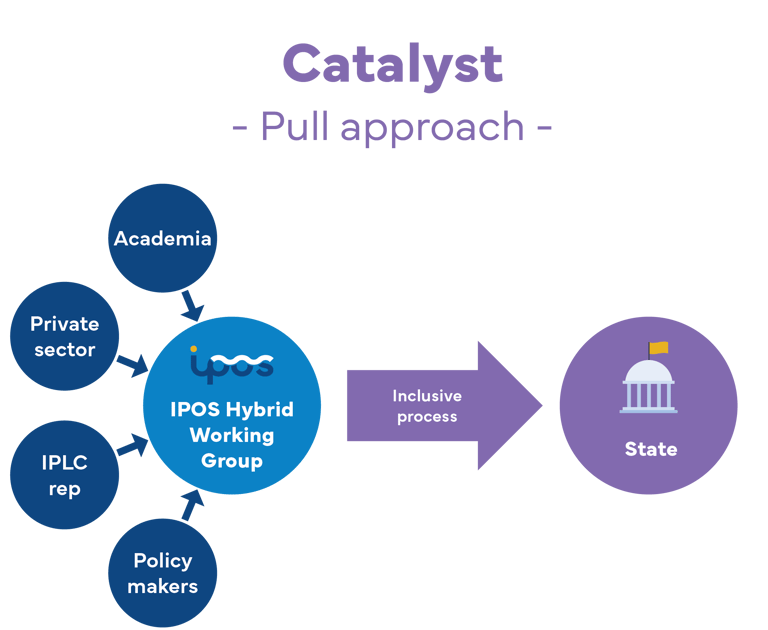

The Ocean Catalyst will provide an inclusive process for dynamic exchanges on emerging scientific and societal priorities based on shared experience and best practices. Input may be provided by diverse knowledge and rights holders including Indigenous and local communities, civil society, the scientific community, civil servants, youth organisations, and the private sector. This service aims to catalyse solution-driven action towards international Ocean targets. Potential submissions may highlight issues such as strategies to limit ongoing industrial fishing in marine protected areas, marine spatial plans for coastal development plans that threaten critical habitats, or the need for more robust environmental impact assessments for offshore renewable energy projects.
IPOS will be guided by core values that will shape its structure and operations, driving innovation and enhancing its contribution to the system:
Credibility, established through impartiality, transparency in governance and process, scientific rigor through peer-review, open-access data and outputs, and building trust with a wide array of stakeholders;
Inclusivity, ensured through the equitable involvement of diverse voices, from local communities and scientists to policymakers and private sector leaders, in IPOS’ structures and working processes;
Contextual relevance, with solutions that are tailored to the socio-economic, cultural and environmental contexts of each country or region through the inclusion of among others, Indigenous and local knowledge holders, and facilitated by interactive exchange between the IPOS Secretariat and requesting entities;
A systems approach, recognising the complex interactions between the Earth system, ecosystems, biodiversity, human activities and well-being;
Efficiency and effectiveness, by providing cohesive, timely knowledge and policy options by consolidating best available ocean knowledge and expertise for meaningful impact; and
Reflexivity, with regular evaluation and monitoring of processes and outputs, allowing for adaptability to evolving needs.
Draft decentralized and collaborative governance model
A decentralized and multi-stakeholder IPOS governance model is proposed to maximize regional and local engagement:
The Secretariat will be responsible for the overarching coordination of IPOS activities, ensuring that activities carried out at regional and national level align IPOS core principles, strategic goals and methodological approaches, and facilitate the exchange of best practices.
The Steering Committee will provide oversight of operations and strategy and will include the IPOS Executive Secretary, Chairs of the Advisory Board, Knowledge Committee, and the Coalition of Scientific Institutions, Heads of the Regional Offices, Chair of the Coalition of Scientific Institutions, and Heads of IPOS hosting organisations.
The Strategic Partners will have an observing role and may provide input to operations and strategy, contributing to complementarity and synergies with environmental assessment processes through inclusion of representatives from organisations such as IPCC, IPBES, the UN Division for Ocean Affairs and Law of the Sea (DOALOS), the Joint Group of Experts on the Scientific Aspects of Marine Environmental Protection (GESAMP), and others.
The Knowledge Committee will assist with the technical and scientific aspects of the production and delivery of the IPOS services and will include diverse knowledge holders from across the world.
Regional Nodes, aligned with one of the existing UN regional institutional frameworks, will allow for a decentralised approach and facilitate concurrent IPOS services across the globe. These Offices will manage regional requests and delivery of IPOS services, with assistance from the Secretariat, and the Knowledge Committee to ensure relevant best practices, knowledge and expertise are considered, supported by active collaboration with existing regional knowledge organisations and networks.
As an overarching resource, the Global Knowledge Network will provide a repository of IPOS experts and knowledge holders, divided into Regional Knowledge Networks including diverse experts and stakeholders who can be drawn upon to join IPOS working groups or to review IPOS outputs. It will also facilitate peer-to-peer exchanges of best practices on the implementation of Ocean targets between experts and policy practitioners, linking to all services.
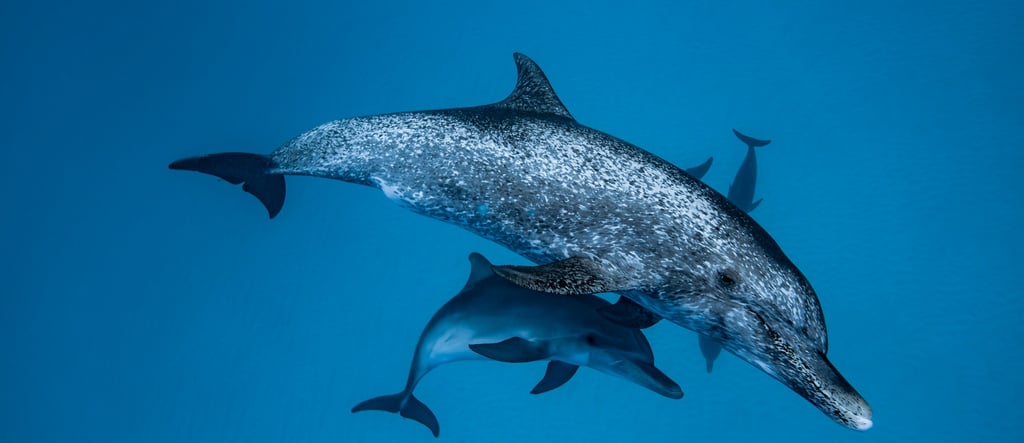

Picture courtesy of @alexis.rosenfeld
A phased approach towards a global launch
The IPOS Secretariat is envisaged to be integrated within the UN Ocean Decade, and initially led by the Ocean Sustainability Foundation, and potentially co-led by a UN agency in due course. A global consultation led by the “Towards IPOS” consortium confirmed that the innovative IPOS services proposed have the potential to enrich the Ocean knowledge-to-policy landscape by coalescing knowledge and re-energising momentum towards Ocean sustainability, and will act as an important legacy for the Ocean Decade into the future.
The IPOS test phase will be launched at UNOC-3 in June 2025 marking the beginning of a two-year “test period” during which its concept and proposed services will be piloted in a reflexive and adaptive manner, before scaling its ambition. This test period will be structured in three phases:
Building the foundations. Months 1-3 will focus on the establishment of central governance bodies (i.e. the Secretariat, Steering Committee and Knowledge Committee), refinement of procedures for each service, identification of States and/or regions to test IPOS services, and establishment of several Regional Nodes and their respective Regional Knowledge Networks.
Testing and feedback. Months 4-16 will involve piloting the IPOS services in several regions, gauging interest from additional States and regions for IPOS services, building the Global Knowledge Network, and identification of process improvements.
Roadmap to consolidation. Months 16-24 will involve taking stock of the knowledge gained during the test period, developing a roadmap, consolidating governance bodies, and fundraising in preparation for a global launch.
Funding is anticipated from multiple sources including States’ voluntary contributions, with several discussions underway, and philanthropic funding, with multiple donors already supporting the “Towards IPOS” initiative. The budget for a fully functioning IPOS depends on the number of requests and a preliminary estimate is available on request (for further details on the cost drivers and assumptions underpinning the draft preliminary budget please see the IPOS FAQ-Blueprint which is available on request).
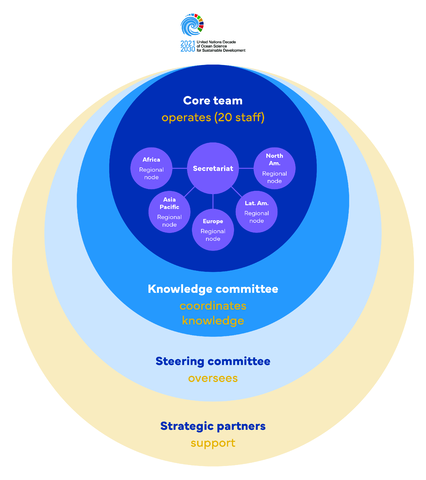

Co-constructed evolution and growing momentum
The IPOS concept was first proposed in 2022, and later that year presented to the global community. Early support for the concept was expressed by the European Commission, which materialized in the “Towards IPOS” consortium in 2024.
The IPOS concept has since matured, thanks to a large-scale consultation involving hundreds of stakeholders from multiple backgrounds and geographies, which revealed a growing consensus that the innovative services proposed for the IPOS have the potential to strengthen the knowledge-policy-society interface and lead to accelerated policy action towards Ocean sustainability. Political support is growing internationally and scientific consensus continues to expand with an ever-increasing IPOS coalition of scientific institutions (currently 58 institutions).
Underpinning the IPOS’ evolution, a globally representative interim Advisory Board and an innovative and inclusive Knowledge Committee Development Team, currently provide support, advice and strategic guidance in order to build an effective, truly inclusive and equitable IPOS.
The interim governance of the Towards IPOS Consortium includes an innovative Knowledge Committee Development Team tasked with ensuring that the core values and principles of IPOS remain central in the co-design phase of the initiative. The Knowledge Committee Development Team comprises experts from diverse academic and non-academic disciplines across multiple regions.
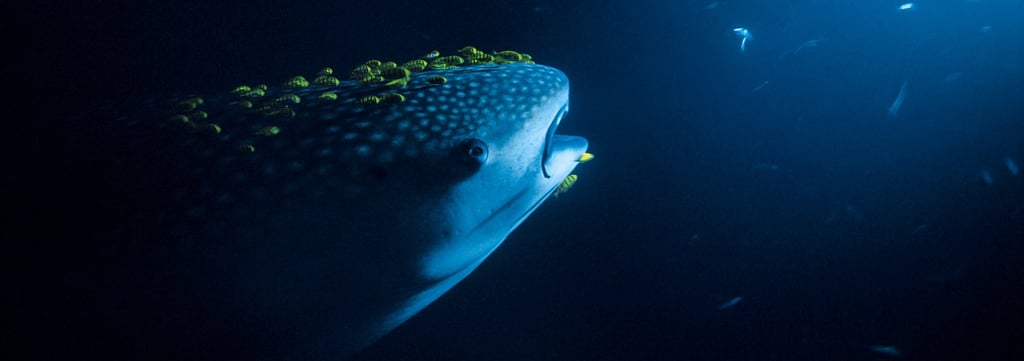

Picture courtesy of @alexis.rosenfeld
An urgent call for Ocean action
The rapid evolution and momentum of the IPOS concept reflects a critical truth: the Ocean is in trouble, and we must now move forward coherently and effectively to ensure its future in supporting humanity.
IPOS will be the first global, demand-driven Ocean knowledge-to-policy mechanism to operate across scales, and provide services with the potential to coalesce the re-energized momentum generated by the Ocean Decade and its partners, and a means to create a legacy, securing the Ocean we want and need.
This document constitutes an invitation to join this IPOS journey and help shape this new mechanism to maximize action toward Ocean sustainability.
Join us on the IPOS journey!
For more information and collaboration please contact us at info[at]ipos.earth


Picture by Antonella Ragazzoni

